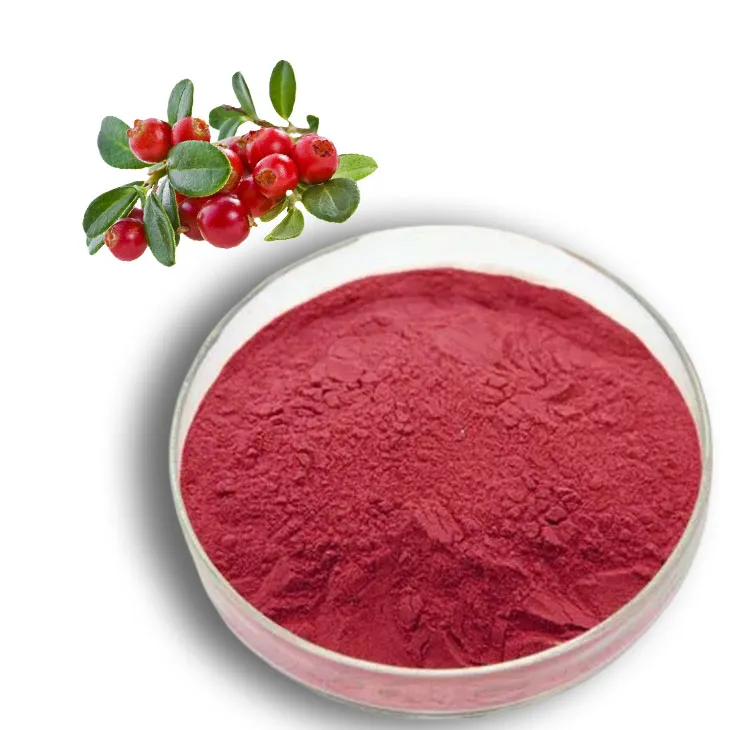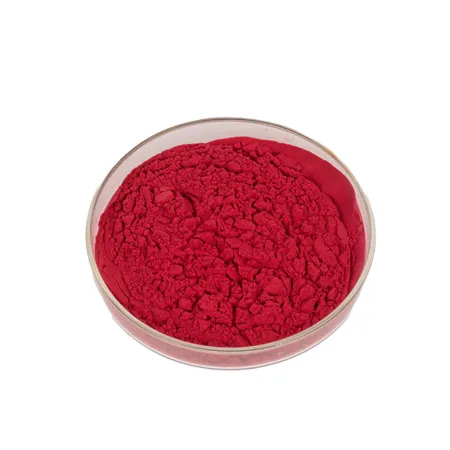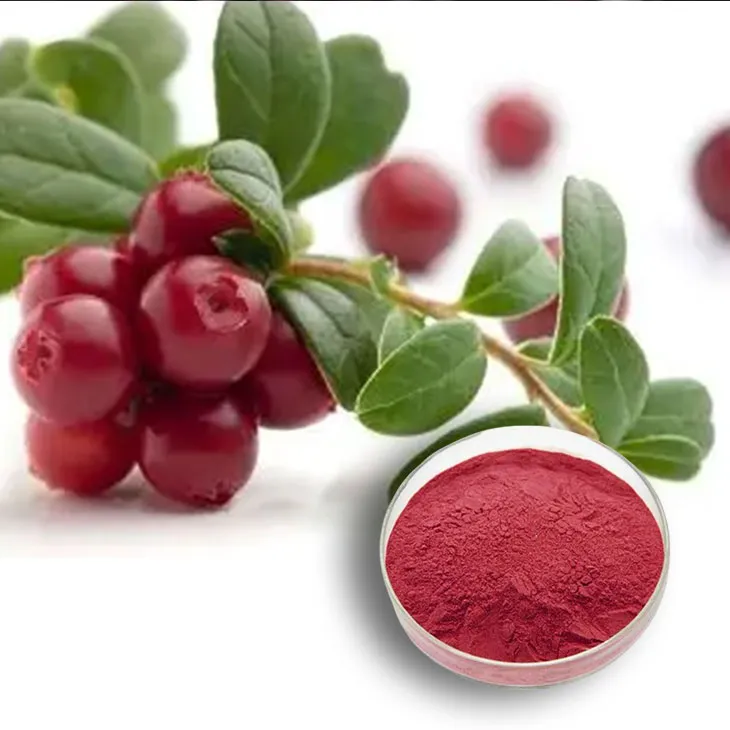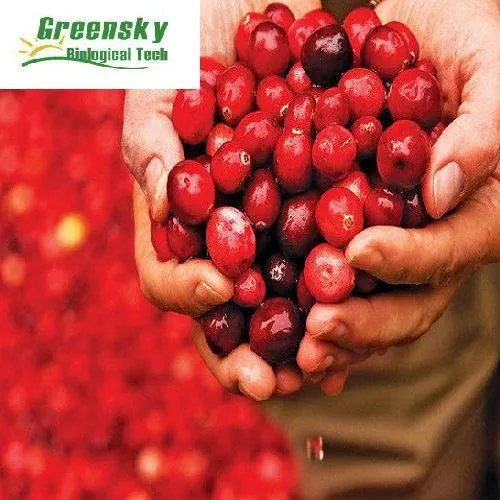- 0086-571-85302990
- sales@greenskybio.com
The best cranberry extract in nature.
2024-11-29

Introduction to Cranberry Extract
Cranberry Extract, sourced from nature, is indeed a remarkable substance. It has gained significant attention in various fields due to its diverse range of properties and potential benefits. Cranberries, native to North America, have been used for centuries by indigenous peoples for their medicinal properties. With modern extraction techniques, we are now able to harness the power of cranberries in a more concentrated and accessible form - Cranberry Extract.

Health - Promoting Effects in Dietary Supplements
Cholesterol - Lowering Potential
One of the most studied aspects of cranberry extract in the realm of dietary supplements is its potential to lower cholesterol levels. The bioactive components within cranberry extract are thought to interact with the body's lipid metabolism mechanisms. Research has shown that certain compounds in cranberry extract may inhibit the absorption of dietary cholesterol in the intestines. For example, proanthocyanidins, which are abundant in cranberry extract, may bind to cholesterol molecules, preventing their uptake into the bloodstream. This interaction could potentially lead to a reduction in overall cholesterol levels, particularly low - density lipoprotein (LDL) cholesterol, often referred to as "bad" cholesterol.
Benefits for the Digestive System
Cranberry extract also offers significant benefits for the digestive system. It can help maintain a healthy gut environment, which is crucial for overall well - being. The gut microbiota, consisting of trillions of bacteria, plays a vital role in digestion, immune function, and even mental health.
Cranberry extract may promote the growth of beneficial bacteria such as Lactobacillus and Bifidobacterium. These beneficial bacteria are important for maintaining a balanced gut flora. At the same time, cranberry extract has been shown to inhibit the growth of harmful bacteria like Escherichia coli (E. coli) that can cause various digestive problems. The antibacterial properties of cranberry extract are attributed to its unique chemical composition, which can disrupt the cell membranes of harmful bacteria, thereby preventing their growth and proliferation.

Applications in the Food Industry
Natural Flavor Enhancer
In the food industry, cranberry extract serves as an excellent natural flavor enhancer. Its tart and fruity flavor can add a unique taste to a wide variety of foods. For instance, in the production of baked goods such as muffins and cakes, cranberry extract can provide a tangy and refreshing flavor note that complements the sweetness of the other ingredients. It can also be used in the formulation of beverages, like fruit juices and smoothies, to enhance the overall flavor profile. The addition of cranberry extract can give these drinks a more complex and appealing taste, without the need for artificial flavorings.
Preservative Properties
Another important application of cranberry extract in the food industry is as a preservative. Its antibacterial properties are not only beneficial for the digestive system but also for extending the shelf life of food products. By inhibiting the growth of bacteria, yeast, and molds, cranberry extract can help keep food fresh for longer periods. In the case of processed meats, cranberry extract can be used as a natural alternative to synthetic preservatives. It can prevent spoilage and the growth of harmful microorganisms, ensuring the safety and quality of the food. Similarly, in dairy products like yogurt and cheese, cranberry extract can be added to enhance their shelf life while maintaining their natural flavor and nutritional value.

Composition and Bioactive Compounds
Cranberry extract is rich in a variety of bioactive compounds that contribute to its diverse properties. As mentioned earlier, proanthocyanidins are a major component. These are large - molecule flavonoids that have antioxidant properties. Antioxidants are important for protecting the body against oxidative stress, which is associated with various diseases such as cancer, heart disease, and neurodegenerative disorders.
Another important compound in cranberry extract is quinic acid. Quinic acid has been shown to have anti - inflammatory properties. Inflammation is a natural response of the body to injury or infection, but chronic inflammation can lead to many health problems. The anti - inflammatory action of quinic acid in cranberry extract may help reduce the risk of developing inflammatory - related diseases.
Cranberry extract also contains phenolic acids, such as caffeic acid and ferulic acid. These phenolic acids have been studied for their potential health benefits, including their ability to scavenge free radicals and protect cells from damage.

Research and Scientific Evidence
There has been a significant amount of research on cranberry extract in recent years. Many scientific studies have been conducted to investigate its various properties and potential benefits. For example, clinical trials have been carried out to study the effect of cranberry extract on cholesterol levels. These trials have involved participants with different cholesterol profiles, and the results have provided valuable insights into the potential of cranberry extract as a cholesterol - lowering agent.
In the area of digestive health, numerous in - vitro and in - vivo studies have been done. In - vitro studies have shown the antibacterial activity of cranberry extract against harmful gut bacteria. In - vivo studies, on the other hand, have demonstrated its ability to modulate the gut microbiota in animal models. These studies provide a scientific basis for the use of cranberry extract in promoting digestive health.
Regarding its applications in the food industry, research has focused on its effectiveness as a flavor enhancer and preservative. Sensory evaluation studies have been carried out to determine the impact of cranberry extract on the flavor of different foods. At the same time, microbiological studies have investigated its antibacterial and antifungal properties to evaluate its potential as a preservative.
How to Incorporate Cranberry Extract into Your Diet
If you are interested in reaping the benefits of cranberry extract, there are several ways to incorporate it into your diet.
- Dietary Supplements: Cranberry extract is available in the form of capsules, tablets, and liquid supplements. These can be easily purchased from health food stores or online retailers. When choosing a dietary supplement, it is important to look for a high - quality product from a reputable manufacturer. Read the label carefully to ensure that the supplement contains a sufficient amount of cranberry extract and does not contain any unwanted additives or fillers.
- Food and Beverage Additions: You can add cranberry extract to your homemade foods and beverages. For example, a few drops of cranberry extract can be added to your morning smoothie for an extra burst of flavor and added health benefits. In cooking, cranberry extract can be used in sauces, marinades, and dressings. It can add a tangy flavor to meat dishes, salads, and vegetables.
Conclusion
In conclusion, cranberry extract from nature is truly a wonder. It has a wide range of applications in both the dietary supplement and food industries. Its potential health - promoting effects, such as cholesterol - lowering and digestive system support, make it an attractive option for those looking to improve their health. Additionally, its use as a natural flavor enhancer and preservative in the food industry offers a more natural and healthy alternative to synthetic products. With ongoing research, we are likely to discover even more benefits of cranberry extract in the future. However, it is important to note that while cranberry extract shows great promise, it should not be considered a substitute for a balanced diet and a healthy lifestyle.
FAQ:
What are the main functions of cranberry extract?
Cranberry extract has multiple functions. It may help lower cholesterol levels as its bioactive components can interact with the body's lipid metabolism mechanisms. For the digestive system, it can maintain a healthy gut environment by promoting the growth of beneficial bacteria and inhibiting harmful ones. In the food industry, it is used as a natural flavor enhancer and preservative with its tart and fruity flavor adding a unique taste to foods and its antibacterial properties extending the shelf life of food products.
How does cranberry extract interact with the body's lipid metabolism?
The bioactive components in cranberry extract may interact with the body's lipid metabolism mechanisms, which is one of the reasons it has the potential to lower cholesterol levels. However, the exact molecular mechanisms are still under research.
Can cranberry extract really help maintain a healthy gut?
Yes, it can. Cranberry extract can help maintain a healthy gut environment. It may promote the growth of beneficial bacteria and inhibit the growth of harmful ones in the digestive system.
What makes cranberry extract a good natural flavor enhancer?
Its tart and fruity flavor makes cranberry extract a good natural flavor enhancer. It can add a unique taste to various foods in the food industry.
How does cranberry extract act as a preservative?
Cranberry extract has antibacterial properties. These properties help it act as a preservative in the food industry as it can inhibit the growth of bacteria, thereby helping to extend the shelf life of food products.
Related literature
- The Health Benefits of Cranberry Extract: A Comprehensive Review"
- "Cranberry Extract in Dietary Supplements: Efficacy and Safety"
- "Cranberry Extract and its Role in Food Preservation and Flavor Enhancement"
- ▶ Hesperidin
- ▶ citrus bioflavonoids
- ▶ plant extract
- ▶ lycopene
- ▶ Diosmin
- ▶ Grape seed extract
- ▶ Sea buckthorn Juice Powder
- ▶ Beetroot powder
- ▶ Hops Extract
- ▶ Artichoke Extract
- ▶ Reishi mushroom extract
- ▶ Astaxanthin
- ▶ Green Tea Extract
- ▶ Curcumin Extract
- ▶ Horse Chestnut Extract
- ▶ Other Problems
- ▶ Boswellia Serrata Extract
- ▶ Resveratrol Extract
- ▶ Marigold Extract
- ▶ Grape Leaf Extract
- ▶ blog3
- ▶ blog4
-
Nature's Bounty Lily Extract.
2024-11-29
-
melatonin extract
2024-11-29
-
American Ginseng Root Extract
2024-11-29
-
Alisma Extract
2024-11-29
-
Wheat Germ Extract
2024-11-29
-
Aminolevulinic acid
2024-11-29
-
Acai Berry Extract
2024-11-29
-
Longan Extract
2024-11-29
-
Black Pepper Extract
2024-11-29
-
Kupilu Extract
2024-11-29
-
Hesperidin
2024-11-29





















